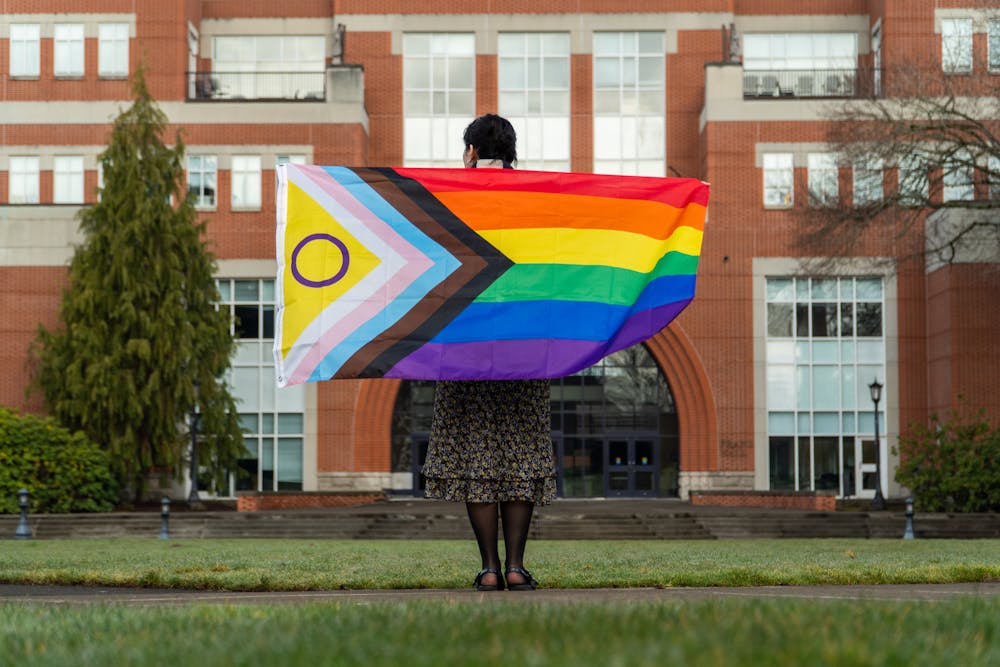More than a decade after students advocated for adding gender identity to UP’s non-discrimination policy, the Board of Regents is considering it. According to an email from Director of Public Affairs Dan Christopherson, regents discussed adding gender identity to the policy in January, but said he could not provide details.
“The conversations continue, and the Board will continue its dialogue on this important matter in the very near future,” Christopherson said. “In the meantime, the University’s commitment to building a campus community free from discrimination remains unchanged. Dr. Kelly and University leadership — including incoming Vice President for Student Affairs & Inclusive Excellence Dr. Alvin Sturdivant — are focused on promoting a culture of respect, belonging, and inclusion. Dr. Kelly is grateful for his recent meetings with ASUP leadership and students who are advocating for this change.”
The revived discussion about adding gender identity to the non-discrimination policy follows the unanimous passage of the Associated Students of the University of Portland’s (ASUP) resolution S.R. 23-24-002, which called on the administration to support and initiate adding gender identity to the non-discrimination policy in the fall semester of 2023.
ASUP resolutions are essentially recommendations for the administration to consider when it comes to major university policies. However, student leaders have continued to advocate for the change since this resolution’s passage.
It remains unclear when the Board will vote or how the process will continue.
Junior ASUP Senator Shane Ruyle, who helped draft the resolution, says it comes at a time when some students may fear how their identity impacts their safety on and off campus.
“It isn't a stretch or dramatic to fear for your physical safety, let alone your emotional safety in the larger national political climate,” Ruyle said. “Acknowledging that the only legal protections that trans students have are not institutional but federal — that's a really scary thing. We need an institution that's going to say, ‘We value and we are going to protect you.’”
In the last few weeks, the Trump administration has continued to target transgender people with executive orders, including prohibiting “men to self-identify as women,” halting federal support for gender-affirming health care for transgender youth and barring transgender athletes from competing in women’s sports.
With more uncertainty ahead, Gender and Sexuality Partnership (GSP) President Ben Wolff says adding gender identity to the non-discrimination policy is urgent. In addition to Trump targeting transgender and LGBTQ+ people, a federal judge in Kentucky struck down the Biden administration's revised Title IX policy in January, which broadened protections for LGBTQ+ and transgender students.
“We need protections from anybody that will give them to us because we can't assume that they will come from the federal government,” Wolff said. “It's really important to put gender identity as a part of our non-discrimination agreement so that trans students are safeguarded at this university. It would be a large step in making trans students feel comfortable at this university, especially with the looming legislation that could take away the rights of trans students.”
In 2013, students, faculty and staff sought to include sexual orientation and gender identity in the non-discrimination policy, later known as the Redefine Purple Pride movement.
The Board of Regents voted on the amendment to include sexual orientation but excluded gender identity because gender identity “is an issue for the Catholic Church,” then-President Rev. E. William Beauchamp said at the time. However, other Catholic institutions, such as Gonzaga, Loyola University Maryland and Santa Clara, include gender identity in their non-discrimination policy.
A change to the non-discrimination policy requires the approval of The Board of Regents, UP’s highest governing body. Beauchamp is just one of 42 Board of Regents members publicly listed on the UP website.
In response to The Beacon's inquiries, Christopherson said he was unable to comment on the latest developments of the Regents’ process, including how many and what Board of Regents members were eligible to vote on the proposed amendment and when they would vote.
Wolff believes most students support adding gender identity to the non-discrimination policy and urges the Regents to enact the change.
After the ASUP Senate passed the resolution, student leaders awaited a response from the administration. Seventeen students, including resident assistants (RA) and club leaders, signed a letter asking the Board of Regents to support adding gender identity to the non-discrimination policy.
“Students have been advocating for this addition since 2013 when the Board of Regents approved the addition of sexual orientation to the policy,” the letter said. “A decade later, University of Portland students still believe this is a necessary step in continuing to build an inclusive, welcoming, and safe environment for all students, faculty and staff at UP.”
Wolff was one of the students who signed the letter. A year after the letter was sent, Wolff is frustrated that the change still hasn’t happened.
“It feels like there's a lot of secrecy, that they're not being fully transparent with us, that they don't want students to know this, and that they don't really care what the students think,” Wolff said. “The University isn't acting on it [ASUP resolution] because they're placing their own interests ahead of what the student body wants.”
Vice President of GSP Leonidas Grimshaw feels similarly and feels the administration has not been transparent with students on this issue.
“I feel as though it was definitely disheartening to see it being brushed under the rug and kind of seeing people in charge kind of try to wait us out,” Grimshaw said. “I think [there is] this idea that students are temporary, so the desires are temporary, and we can kind of wait them out…I do think that is really disheartening and disappointing because I think the University, at the end of the day, is supposed to serve us and what we need.”
Student leaders claim there was a miscommunication between them and the administration regarding how the non-discrimination policy could be amended to add gender identity, causing a delay in starting the process, which Christopherson confirmed.
However, students were told the correct information only after planning a demonstration in January. Ruyle claims the University did not attempt to schedule a meeting with student leaders to clarify this information before the planned demonstration date despite their requests.
During the Redefine Purple Pride movement, after students had already demonstrated once, they chose not to demonstrate again after more dialogue on the matter started between students and the administration — similar to what’s happening now.
What’s different this time, and what may influence Regents, is that the Trump administration has threatened to withhold federal funds from institutions that defy his orders, according to a report by the Associated Press (AP).
Kimberly Cortez is the Editor-in-Chief of The Beacon. They can be reached at cortez25@up.edu.








